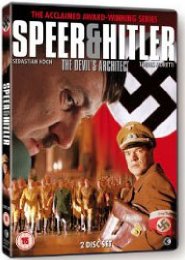Hitler & Speer: The Devil's Architect
Hitler & Speer: The Devil's Architect
Albert Speer was one of the enigma's of the Nazi regime. An architect by trade, he caught Hitler's imagination early on and fed upon the Nazi leader's incessant need for grandiose monuments and buildings to celebrate the Third Reich in a bigger manner than either the ancient Roman and Greek empires that still provide monuments to their own architectural prowess centuries later.
Speer was ultimately good friends with Hitler and kept him happy with grandiose buildings like the Riech Chancellery ostentatious monuments such as the Zeppelinfeld stadium as seen in footage of the Nuremburg rallies and most famously in Leni Riefenstahl's Triumph of the Will. Speer had a Bavarian home not far from Hitler's famous Berghof residence and would often be at his leader's side, the two often walking alone through the nearby countryside discussing architecture and future plans.
Speer had plans and permission from his leader to radically redesign Berlin as a capital city fit for such a glorious regime and Speer threw himself into those plans until February 1942 when he was appointed Minister of Armaments after a plane crash had killed his predecessor. Speer was apparently reluctant to take on this role but was effectively forced to take it by Hitler, much to Goering's disappointment who was always on the lookout for new powers.
Speer revolutionised the armaments industry in such a way that the Allies were astounded that despite their incessant bombing raids, they appeared to be unable to slow down the rate of armaments being produced. Speer also oversaw the factory building Hitler's pet terror weapons at Mittelwerk and was apparently distressed by the conditions that the slave labour endured, implementing a slightly less harsh regime that ultimately had little effect.
After the fall of Berlin, Speer was captured by the Allies and placed on trial with all other surviving top Nazi's at the Nuremburg trials. Speer went a different way to many of his peers, apologising for the Nazi atrocities and taking responsibility for its actions. Speer also told a sceptical audience about his own plan to assassinate Hitler in 1945 using poison gas when he realised that Hitler was happy for the German people to perish alongside him in defeat but was supposedly thwarted by a single high wall built in front of an air intake. Speer was found guilty on two of four charges and therefore sentenced to prison in Spandau for 20 years. What saved him from the death penalty was probably his active sabotaging of Hitler's scorched earth policy to prevent the invading Allies from benefitting from Germany's infastructure and dwindling resources.
Despite security measures, Speer managed to write and smuggle out the basis of his memoirs and had these published after his release from Spandau in 1966, having served his full sentence. Speer's protestations about being unaware of the Nazi atrocities against the Jews helped him remain popular and virtually untainted by his past associations, and a second book appeared only to increase his popularity as the "good" Nazi.
Hitler & Speer: The Devil's Architect is a German TV mini series starring Sebastian Koch as Speer and Tobias Moretti as his leader and friend, Hitler. The mini series is superbly made and isn't, as expected, just a dramatisation of the events but a mix of modern interview footage with Speer's children and other relevant people plus news footage of the time. The events themselves follow the memoirs of Speer, but the interviews that are dispersed throughout raise relevant questions or doubts on what has just been shown. Using Speer's children is a master stroke and it is clear that some of the things that they discover are quite disturbing to them. What they don't question is how close their father was to Hitler, but some of them have blocked out all childhood memories of that time - and who can blame them?
The Series is in four parts, and the final part titled 'Epilogue - The Deception' is where the serious questioning of Speer begins. Previously no one questioned Speer too closely about his involvement in the Holocaust but in the great tradition of Nazi and German bureaucratic thoroughness, detailed documents have emerged over the years that raised doubts. It now appears clear that Speer's plans for a new Berlin had massive consequences. It appeared that Speer's plans included tearing down old buildings that would be replaced by more grandiose buildings and monuments - this would leave a number of German citizens displaced and homeless.
The solution to this problem was both simple and a natural part of the Nazi regime. It turns out, through the inevitable detailed documentation, that Speer was responsible for evicting Jewish families from Berlin homes and reallocating them to displaced Aryan families. Not only that, but his fingerprints are all over the expansion plans and building material specs for various concentration camps including Auschwitz. So the question remains, just how could he now claim not to be aware of the atrocities committed the regime that he was within the top echelons of?
It would appear that history has very much rewritten itself in the case of Albert Speer, but it took until his death for most of this to emerge. This docudrama does an excellent job of laying it all out on the line for everyone to see - not only his own sanitised view of what happened, but also the truth as discovered by modern German historians.
Recommended.






























Your Opinions and Comments
Be the first to post a comment!